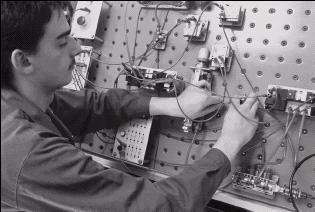 <a onClick="window.open('/olcweb/cgi/pluginpop.cgi?it=jpg:: ::/sites/dl/free/0072463317/55200/troubleshooting.jpg','popWin', 'width=365,height=282,resizable,scrollbars');" href="#"><img valign="absmiddle" height="16" width="16" border="0" src="/olcweb/styles/shared/linkicons/image.gif"> (16.0K)</a> <a onClick="window.open('/olcweb/cgi/pluginpop.cgi?it=jpg:: ::/sites/dl/free/0072463317/55200/troubleshooting.jpg','popWin', 'width=365,height=282,resizable,scrollbars');" href="#"><img valign="absmiddle" height="16" width="16" border="0" src="/olcweb/styles/shared/linkicons/image.gif"> (16.0K)</a>
Troubleshooting an electronic circuit board.
© Michael Rosenfeld/Getty Images |
Career in Electronics One area of application for electric
circuit analysis is electronics. The term electronicswas originally
used to distinguish circuits of very low current levels.
This distinction no longer holds, as power semiconductor
devices operate at high levels of current. Today, electronics
is regarded as the science of the motion of charges in a
gas, vacuum, or semiconductor. Modern electronics involves
transistors and transistor circuits. The earlier electronic circuits
were assembled from components. Many electronic
circuits are now produced as integrated circuits, fabricated
in a semiconductor substrate or chip. Electronic circuits find applications in many areas,
such as automation, broadcasting, computers, and instrumentation.
The range of devices that use electronic circuits
is enormous and is limited only by our imagination. Radio,
television, computers, and stereo systems are but a few. An electrical engineer usually performs diverse functions and
is likely to use, design, or construct systems that
incorporate some form of electronic circuits. Therefore, an
understanding of the operation and analysis of electronics
is essential to the electrical engineer. Electronics has
become a specialty distinct from other disciplines within
electrical engineering. Because the field of electronics is
ever advancing, an electronics engineer must update his/her
knowledge from time to time. The best way to do this is
by being a member of a professional organization such as
the Institute of Electrical and Electronics Engineers (IEEE).
With a membership of over 300,000, the IEEE is the largest
professional organization in the world. Members benefit
immensely from the numerous magazines, journals, transactions,
and conference/symposium proceedings published
yearly by IEEE. You should consider becoming an IEEE
member. |

